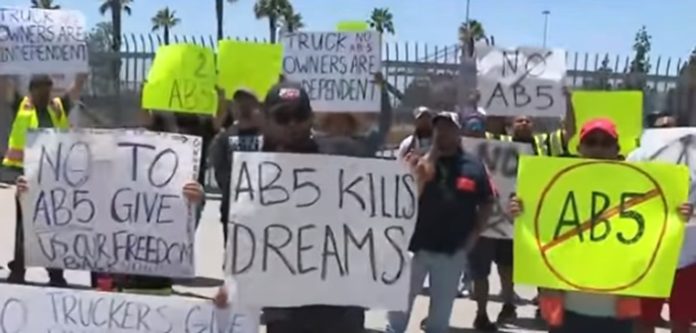-
Independent truckers stage protest at Los Angeles and Oakland ports against a California state law called AB5, or “gig worker” law, which sets tougher standards for classifying them as independent contractors
-
Truck owner-drivers temporarily blocked other trucks that tried to enter the port to pick up or drop off cargo, backing up traffic, on July 13 and then on July 18
-
The stoppage, which protesters say will last through July 20, threatens to aggravate clogging at the California ports
More than 200 independent truck drivers protested on July 18 a California state law – known as AB5 or the “gig worker law” — halting traffic at Los Angeles and Oakland ports.
The law makes it harder for truckers to transport goods and could limit labor in California’s clogged seaports, threatening to aggravate US supply chain congestions.
The truckers’ strike on Monday had more than 100 truck owner-operators who work for themselves temporarily blocking other trucks that were trying to enter Oakland port to pick up or drop off cargo, backing up traffic in the sprawling shipping complex, reports said.
More than 100 truckers at Los Angeles port also joined the protest, blocking trucks trying to enter the seaport and staging a slow-drive on the highway leading to the United States’ biggest gateway, television footages showed.
The truckers said they would continue to strike through to Wednesday, the reports said.
Some truck drivers had already stopped work on July 13 at the Port of Los Angeles and Long Beach to protest AB5.
California’s ports handle about 40% of container goods that enter the US. Trucking disruptions come at a time when unions and West Coast port employers are also negotiating a high-stakes labor contract, Reuters said.
The truckers’ strike was triggered by the law, known as AB5 or the “gig worker” law, which sets tougher standards for classifying workers as independent contractors.
RELATED READ: US gov’t unveils FLOW initiative to improve supply chain
Independent truckers who now operate under the authority and insurance of companies that hire them for jobs would be burdened with the hefty costs and red tape of taking that on when the law is enacted.
“They want to eliminate us,” said independent driver Douglas Urtado, a protester at Oakland port.
Wayne Feng, wearing a “No on AB5” T-shirt, was quoted by Reuters as saying the law would be so financially draining that drivers “aren’t making anything.”
Legal challenges blocked the law from going into effect in 2020, but the US Supreme Court last month denied a California Trucking Association petition claiming the law is blocked by federal regulations.
Experts say an injunction that put the law on hold could soon be lifted. More than 100 drivers and small trucking company operators opposed to the law swarmed two terminal gates in the Port of Oakland, slowing truck entry to a trickle.
The action came after port truckers in Los Angeles picketed gates and snarled roadways at the nation’s busiest seaport complex last week.
Business owner Josue Mendez, 29, said AB5 would devastate his port trucking firm, which relies on 10 independent drivers to move everything from medical equipment to almonds. “I can no longer hire them” and be in compliance with AB5, said Mendez.
AB5 supporters, which include the Teamsters union that once dominated trucking, say it will crack down on trucking company labor abuses by pushing owners to hire drivers as employees and provide workers’ compensation insurance and other benefits.
Industry groups representing about 20,000 Los Angeles and Oakland truckers, including the Owner-Operator Independent Drivers Association, have asked California Governor Gavin Newsom not to enforce the law until owner-operators have details about how to legally operate as independent contractors.
California’s port trucking work practices trace back to the 1980s, when the US deregulated the sector. That changed the business from one dominated by large, unionized firms to the current model in which most traders rely on independent drivers, many of whom are recent immigrants.
Port driver pay is now one-half to two-thirds less than what it was before deregulation, according to an estimate from Wayne State University economics professor Michael Belzer.





